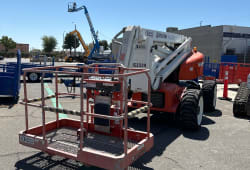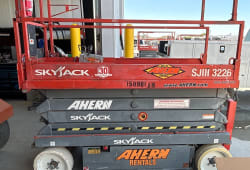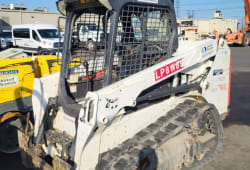Essential Guide to Drilling Hardened Steel: Best Drill Bits for hardened steel and Expert Tips
5 Lectura mínima
)
enero 18, 2025
Drilling through hardened steel can be one of the most challenging tasks in metalworking, whether you're a blacksmith, swordsmith, knife maker, or simply working on tough projects. To make the job easier and avoid costly mistakes, it's crucial to have the right drill bits and the correct technique. Based on years of experience and expert recommendations, here’s a comprehensive guide to the best drill bits for hardened steel, along with tips to ensure success.
1. Bosch Cobalt 42 Bits
Affordable and Effective Bosch Cobalt 42 bits are often considered the go-to option for those who need a budget-friendly drill bit that can handle hardened steel. At around $5 for a 1/4-inch bit, they offer great performance without breaking the bank. While these bits are durable, they do tend to wear out faster if used on work-hardened steel or without cutting fluid.
2. Drill America Carbide Bits
High Performance at a Higher Price If you’re looking for a more durable option, the Drill America Carbide bits are an excellent choice. Priced between $15-20 per bit, they offer impressive performance for drilling through tougher materials. Carbide bits last longer than cobalt, but they can be brittle if not handled carefully. The key is to avoid chipping the cutting edges, which can happen quickly if you’re not cautious.
3. Drill Doctor (Bit Sharpener)
Maintain Sharpness for Longevity One of the best investments you can make when drilling through hardened steel is a quality bit sharpener. The Drill Doctor is a top choice for many professionals. Using diamond stones, this tool can keep your cobalt and carbide bits sharp for years. It’s especially useful for sharpening expensive carbide bits that you want to preserve, even if they’ve been chipped.
4. Cobalt Drill Bits
Tough and Reliable Cobalt drill bits are well-known for their ability to handle high temperatures and wear, making them perfect for drilling through hardened steel. These bits work best at slower speeds (around 500-1000 RPM) and require generous amounts of cutting fluid to maintain sharpness and prevent overheating. Cobalt bits are a great balance between cost and performance, making them a staple in many workshops.
5. Carbide End Mills
Ideal for Enlarging Holes If you need to enlarge holes in hardened steel, carbide end mills are a great option. These bits are designed specifically for hard materials and can handle tough tasks. However, they can be expensive and prone to breaking if used improperly. If you decide to go with carbide end mills, be prepared to handle the pressure and pay attention to your technique.
6. Speed and Feed Charts
Optimize Your Drilling Drilling through hardened steel requires careful attention to the speed and pressure applied. Speed and feed charts are invaluable resources that help you choose the right RPMs based on the size of your bit and the material you're working with. For hardened steel, it’s important to apply significant pressure—enough to ensure the bit bites into the material. Insufficient pressure will cause the bit to skate, generating heat that can dull the bit quickly.
7. Cutting Fluids
Cool Down and Protect Your Bits Always use cutting fluid when drilling through hardened steel. This helps keep the bit cool, reduces friction, and prolongs the life of your drill bits. There are many types of cutting fluids available, such as sulfurized dark cutting oil or coolant oils like Trim-Sol. Make sure to apply it generously to prevent the bit from overheating and becoming dull.
8. Single Flute Carbide Drill Bits
Perfect for Hard Materials For especially tough materials, single flute carbide drill bits are an excellent choice. These bits allow for higher RPMs and are often run dry (without lubrication), although using cutting fluids can still improve the drilling process. Carbide bits provide excellent precision and longevity, but be careful with their brittle nature.
9. DeWalt Pilot Point Cobalt Bits
Versatile and Durable DeWalt’s Pilot Point Cobalt bits are versatile and durable, making them a great option for various metalworking applications, including drilling through hardened steel. The key to using these bits effectively is to avoid wobbling—if the drill wobbles, the bit could snap under pressure. Keep the material steady and ensure the drill is properly aligned.
10. Tile/Porcelain Drill Bits
An Alternative for Tough Steel Some users have found success using tile or porcelain drill bits for hardened steel, especially when traditional bits don’t work. These bits may provide better luck in challenging situations, although they aren’t typically the first choice for hardened steel.
11. Use of Vise
Stabilize Your Material When drilling through hardened steel, always secure your material in a vise. Attempting to hold the steel by hand can lead to unstable drilling, causing wobbling and increasing the risk of breaking your bits. If you don’t have a portable vise, clamping your workpiece to a solid surface will work as well.
12. Lubricants like TapMagic or WD-40
Essential for Smooth Drilling Lubricants such as TapMagic or WD-40 are essential when drilling through hardened steel. Not only do they reduce friction, but they also help to transfer heat, which is crucial for preventing bit wear. Use plenty of lubricant to ensure a smooth drilling process, especially when working with tougher materials.
Final Thoughts
Drilling through hardened steel requires precision, patience, and the right tools. With the right drill bits—whether cobalt, carbide, or another specialized option—you can achieve clean, efficient holes in tough materials. Don’t forget the importance of cutting fluids, proper speed, and pressure, as these factors significantly impact the longevity of your drill bits and the overall success of your project. Whether you're a blacksmith, hobbyist, or professional metalworker, investing in quality bits and using proper techniques will ensure your drilling process goes smoothly every time.











